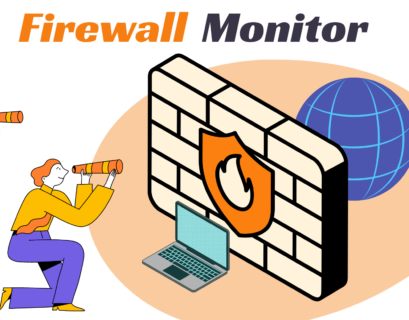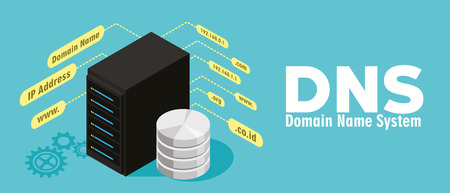DNS management is a common element in the list of features in many hosting solutions providers. Therefore it is important to understand what it actually represents and what you can expect from a feature like that. So, let’s explain a little bit more about it and provide you with more details about how to use our DNS manager – ClouDNS Control Panel!
Table of Contents
DNS Management explained
DNS management is known as the process and activities that involve administering and managing the Domain Name System (DNS) for one specific domain name or for a group of domains. For illustration, it can refer to tasks like creating and modifying different DNS records, managing DNS zones, adding or removing nameservers, and others.
In case you have the responsibility to manage the Domain Name System (DNS) for a particular website, it is best if you have the right and valuable knowledge. It is also crucial to know how to manage your DNS settings appropriately.
Once you know how to handle assignments like adding, editing, and deleting DNS records (for instance, A, MX, and CNAME records), you can easily adjust the DNS configuration as you desire. Thankfully, DNS management tools are available and make it way easier rather than doing it manually.
Why is DNS Management so important?
DNS management is so important due to the fact it provides you with the ability to control and manage how your domain name resolves (DNS resolution). As you may know, this process happens behind the scenes, yet it is crucial for your domain name’s reachability and availability.
For instance, you can use DNS management to direct your domain name to a new email provider or a new web host. A DNS manager can also be important in cases when you have to fix errors in your DNS records or stop cyber threat activity.
Experience Industry-Leading DNS Speed with ClouDNS!
Ready for ultra-fast DNS service? Click to register and see the difference!
How to use our DNS manager (ClouDNS Control Panel)?
ClouDNS provides a DNS manager that is built in a simple way, and it is very user-friendly.
Let’s explain briefly how you can use our DNS manager (ClouDNS Control Panel). We will start by clarifying the different tables on the Dashboard and the Menus in the Header section in the ClouDNS Control Panel.
First, you have to Sign in to your account. Then you will see the following tables with different information regarding your account:
Domain names
Here you can view all of your domain names. Additionally, you can click and:
- Register a new domain – Add your brand new domain name.
- Transfer a domain – Easily move your domain to ClouDNS.
- Renew a domain – Effortlessly renew an expiring domain.

DNS hosting
Here you can view and manage all of your DNS zones. Additionally, you can click and:
- Create zone – Add a new DNS zone.
- Available name servers – View all of your available name servers.

Monitoring
Here you can view all of your Monitoring checks. Additionally, you can click and:
- Add new – Create a new Monitoring check

SSL Certificates
Here you can see all of your available SSL Certificates. Additionally, you can click and:
- Register new – Get a new SSL Certificate for your domain name.

Google Workspace
Here you can see details about your Google Workspace account. Additionally, you can click and:
- Register new – Here, you can add a Google Workspace service in case you don’t have one.

In the Header, you will notice several Menus that are going to help you in different situations. Let’s explain what their purpose is.
- Dashboard: When you click on it, you will be directed to the main web page – “Dashboard” of the ClouDNS Control Panel.
- Billing: In this menu, you can find information about your Payment Method and Auto-Renewal, Orders, Invoices, Account Balance, Vouchers, and Affiliate program.
- Tools: When you click on it, you will see tools for handling complex operations and reports. From there, you can create different jobs that will help you manage your domain names as effortlessly as possible.
- API & Resellers: From this menu, you can adjust and control the API users and API sub-users, and you can find the Reseller panels.
- Services: From this menu, you can easily access and view our DNS services – Premium DNS, DDoS Protected DNS, GeoDNS, and Private DNS servers.
- Support: Here, you can easily reach our 24/7 Live chat Support, open a Ticket or browse our Wiki for detailed information regarding our services.

Benefits of using DNS Management
DNS management is able to deliver a lot of benefits once companies with an online presence start using it. Here are some of the main advantages:
- Better security: Online businesses have one big concern – their safety and put a lot of effort in that direction. DNS management could actually help and improve their security. It provides a way to handle DNS data (DNS records) centrally. That way, they can guarantee that only approved people from the organization have access to the DNS information, which can stop potential unauthorized changes. Besides, using a Managed DNS service ensures that your website is going to be protected from malicious attempts and even DDoS attacks.
- Effortless management: DNS management provides an easier and simple way to manage your website modifications, which is a major advantage. Once modifications are made to a website, the DNS records require to be updated accordingly. Thanks to centralized DNS management, it is possible to automate this procedure and make it much simpler.
- Improved uptime: Another key benefit of using DNS management is exactly the better and increased uptime. When the entire collection of DNS records is in one place, and it is easy to keep track of them, companies can be confident that they are utilizing the most up-to-date information (DNS records). That way, it serves to avoid issues like DNS downtime (DNS outage) due to DNS configuration problems.
Common DNS Management Tasks
DNS management includes a variety of tasks that help keep your domain’s DNS settings accurate, secure, and fully functional. Here are some of the most common ones:
- Creating and editing DNS records: Add, modify, or delete A, AAAA, CNAME, MX, TXT, and other records to control how your domain connects to web servers, mail servers, and services.
- Managing DNS zones: Organize and maintain all DNS records for each domain within structured DNS zones.
- Adjusting TTL (Time-to-Live) values: Set how long DNS data is cached to ensure timely updates when changes are made.
- Monitoring DNS performance and propagation: Track response times and DNS propagation progress to detect and resolve issues quickly.
- Implementing DNS security features: Enable DNSSEC and apply other security practices to protect against DNS spoofing, cache poisoning, and unauthorized access.
- Auditing and cleaning outdated records: Regularly review and remove old or unused entries to prevent misconfigurations and improve reliability.
Performing these tasks consistently helps ensure your DNS operates efficiently, securely, and without interruption.
Difference Between Managed DNS and Self-Managed DNS
When deciding how to handle your domain’s DNS, you have two main options: Managed DNS and self-managed DNS. So, let’s explain a little bit more about them.
Managed DNS refers to outsourcing DNS management to a specialized provider, like ClouDNS. It takes the heavy lifting off your shoulders. With a managed DNS solution, you gain access to features like a user-friendly control panel, enhanced security (DNSSEC), and advanced tools such as GeoDNS, DNS failover, and DDoS protection. Managed DNS is perfect if you want reliable performance, fast DNS resolution, and the peace of mind that comes with 24/7 technical support. It’s especially great for businesses that need scalable solutions without diving into the technical details.
Self-managed DNS, on the other hand, means you’re maintaining and configuring DNS on your own servers. This approach gives you complete control over your DNS settings. However, it requires technical expertise, regular maintenance, and constant monitoring. Self-managed DNS may also expose you to risks like misconfigurations and slower resolution speeds if not optimized.
Choosing between the two depends on your technical expertise, budget, and the criticality of your online presence. For most businesses, managed DNS offers convenience and satisfaction, while self-managed DNS suits those with in-house expertise and specific customization needs.
What to Look for When Choosing a DNS Provider in 2025
DNS Management Best Practices for Beginners
Managing DNS effectively is crucial for maintaining your domain’s accessibility and reliability. Here are some best practices to help beginners streamline the process:
- Understand Your DNS Records: Familiarize yourself with common DNS records such as A, CNAME, MX, TXT, and NS. Each has a specific purpose, and knowing their roles helps you avoid misconfigurations.
- Use Descriptive Labels: Clearly label DNS zones and records for easy identification, especially when managing multiple domains.
- Regularly Audit Your DNS Records: Periodically review your DNS settings to ensure they are up-to-date and remove unused or outdated records.
- Set Appropriate TTL Values: Time-to-Live (TTL) determines how long DNS information is cached. Use shorter TTLs for records you update frequently and longer ones for static records.
- Enable DNSSEC: Secure your DNS by enabling DNS Security Extensions (DNSSEC), which protect against spoofing and ensure data authenticity.
- Implement Monitoring Tools: Use DNS monitoring tools to detect and quickly resolve issues like propagation delays or downtime.
- Back up Your DNS Configurations: Regularly back up your DNS settings to prevent data loss during unexpected changes or server issues.
By following these best practices, beginners can ensure their DNS is reliable, secure, and easy to manage.
Future Trends in DNS Management
With the advancements in technology, the management of DNS is also evolving. Predicting future trends is essential for staying ahead in the constantly changing world of Internet infrastructure. Here are some key areas where DNS management is expected to witness significant developments:
- Integration with New Technologies
The integration of DNS with new technologies is going to shape the future of Internet infrastructure. The adoption of IPv6 is gaining speed while the deficiency of IPv4 addresses becomes a critical concern. Proper DNS management will play a crucial role in ensuring a smooth transition to the newer generation of Internet protocol – IPv6.
The blockchain technology is also influencing DNS. Decentralized and tamper-resistant, blockchain can enhance the security and integrity of DNS records. This innovation can potentially reduce dependency on central authorities and mitigate the risk of malicious activities. That way, it helps secure the Internet’s foundation, meaning the DNS, even further.
- Improvements in DNS Efficiency and Speed
Efforts to optimize DNS efficiency and reduce resolution times are ongoing. With the increasing demand for faster internet experiences, DNS management will focus on minimizing latency and improving the overall speed of domain resolution. Innovations in caching mechanisms, smarter routing algorithms, and improvements in the DNS resolution process itself are expected to contribute to a more responsive Internet.
Additionally, the deployment of edge computing and content delivery networks (CDNs) built with GeoDNS solution will influence DNS management strategies. By strategically placing DNS servers closer to end-users, organizations can minimize the distance data travels, resulting in quicker response times and improved user experiences.
- Evolving Security Measures
As cyber threats become more sophisticated, DNS management will continue to evolve its security measures. DNS Security Extensions (DNSSEC) will remain a cornerstone for ensuring data integrity and authenticity. However, improvements can be made to key management within DNSSEC to strengthen the cryptographic security measures.
Furthermore, the industry may witness advancements in threat detection and analytics. Systems will incorporate more sophisticated tools to catch and mitigate various types of attacks, including those targeting DNS infrastructure. Machine learning and artificial intelligence can play a significant role in developing advanced security mechanisms capable of identifying and responding to emerging threats in real time.
Conclusion
DNS management is an extremely easy-to-use and useful feature. It allows you to manage and adjust your DNS (Domain Name System) effortlessly. Our DNS manager (ClouDNS Control Panel) can be very helpful and serve you to complete all kinds of different tasks!






